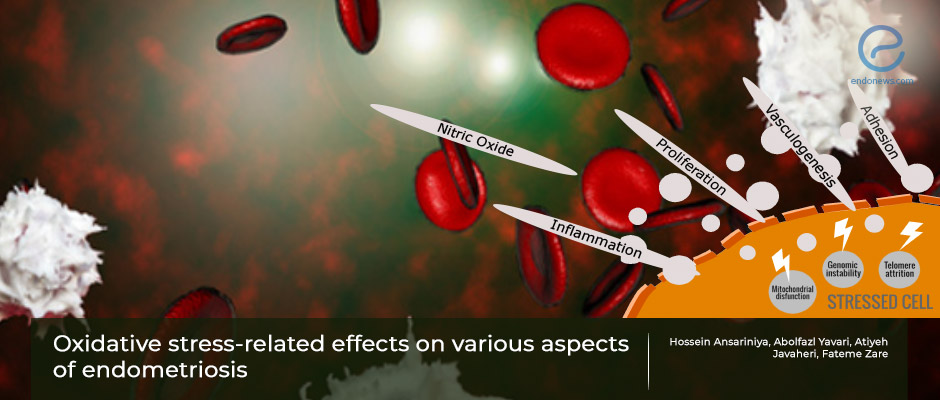The role of oxidative stress on endometriosis symptomatology
Aug 5, 2022
Oxidative stress and its effects on endometriosis.
Key Points
Highlights:
- The oxygen radicals and the cellular-based stress are related to endometriosis's popular symptoms: pain and infertility.
Importance:
- Free iron, reactive oxygen species, and their effects on the inflammatory process are important in endometriosis, targeting therapeutic options.
What's done here:
- The authors explained the role of oxidative stress molecules in endometriosis symptoms step by step by referring to the literature.
Key Results:
- Reactions provoked by iron-induced oxidative stress lead to the development and progression of endometriosis by deregulation of inflammatory genes & oxidative-stress-related molecules.
- Intercellular reactive oxygen species (ROS) in the peritoneal activated macrophages can activate genes related to inflammation, cell proliferation, vasculogenesis, and adhesion.
- Glycodelin is stimulated by oxidative stress, which increases VEGF, and activates angiogenesis on ectopic sites.
- Autoantibodies against oxidative stress are increased in endometriotic patients.
- Stimulation of macrophages for releasing Nitric Oxide (NO) and an increase in NOS have been shown to result in more NO production causing inflammation and infertility in endometriosis patients.
- The link between ROS and mitogen-activated protein kinase signaling pathways causes cell proliferation through PI3K/Akt/mTOR signaling, which might be related to cancers.
- Changes in iron metabolism and related molecules are triggered (TGF, growth factors acting in developing fibrosis, and chronic inflammation).
- Peritoneal fluid NO level is important: The fertility of women with endometriosis can be enhanced by either blocking NO or reducing the peritoneal fluid NO production.
Limitations:
- The review concluded as the therapeutic strategies should consider the effect of oxidative stress and scavengers that would reverse the effects, which requires more clinical well-designed studies.
Lay Summary
Endometriosis is not only a hormonal disease, but it is also an inflammatory illness provoked by hormones.
In the review conducted by Hossein Ansariniya et al., from Iran, the relation between oxidative stress, free radicals, free iron, and the development of endometriotic lesions has been analyzed.
By referring to the literature, the authors explained the role of oxidative stress molecules in endometriosis symptoms. The summary of their findings is listed as followings:
- Iron-induced oxidative stress provokes a set of reactions that leads to the progression and development by causing deregulation of inflammatory genes and oxidative-stress-related molecules.
- Intercellular reactive oxygen species (ROS) in the peritoneal activated macrophages can activate genes related to inflammation, cell proliferation, vasculogenesis, and adhesion (HIF, NFkB, STAT, and CAMs).
- Glycodelin expression is stimulated by oxidative stress, increases VEGF, and activates angiogenesis on ectopic sites.
- Autoantibodies against oxidative stress markers do increase in endometriotic patients (oxidized LDL, carbonic anhydrase I, II, and CA125).
- In endometriosis patients, stimulation of macrophages for releasing Nitric Oxide (NO) and an increase in NOS have been shown, resulting in more NO production causing inflammation and infertility.
- The link between ROS and mitogen-activated protein kinase signaling pathways causes cell proliferation through PI3K/Akt/mTOR signaling, which might be related to cancers.
- When it comes to fibrosis and adhesions, changes in iron metabolism and related molecules are triggered (TGF, growth factors acting in developing fibrosis and chronic inflammation).
- Considering infertility, NO level in the peritoneal fluid is important: The fertility of women with endometriosis can be enhanced by either blocking NO or reducing the peritoneal fluid NO production.
- The therapeutic strategies should consider the effect of oxidative stress and scavengers that would reverse the effects, which requires more clinical well-designed studies.
Research Source: https://pubmed.ncbi.nlm.nih.gov/35781369/
oxidative stress free iron NO endometriosis

